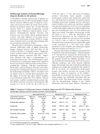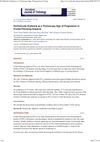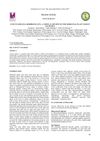7 citations,
March 1990 in “Pigment Cell Research” Certain chemicals cause hair graying in black mice but not yellow mice.
4 citations,
October 2021 in “International Journal of Cosmetic Science” Cirsium japonicum flower extract increases melanin production and could help treat depigmentation conditions.
September 2021 in “CRC Press eBooks” Dissecting cellulitis of the scalp is a condition that causes inflammation and scarring on the scalp, mainly affecting African-American men, and can lead to permanent hair loss.
[object Object]  March 2021 in “Research Square (Research Square)”
March 2021 in “Research Square (Research Square)” Stress likely causes hair loss in Formosan macaques.
August 2021 in “Journal of The American Academy of Dermatology” Newer contraceptives with less androgenic progestins may reduce female hair loss.
 51 citations,
May 2019 in “Biomaterials”
51 citations,
May 2019 in “Biomaterials” Researchers developed a method to grow hair follicles using special beads that could help with hair loss treatment.
April 2024 in “Molecules/Molecules online/Molecules annual” Paris polyphylla saponins may effectively treat acne due to their antibacterial and anti-inflammatory properties.
[object Object]  January 2014 in “Journal of Pharmaceutical Negative Results”
January 2014 in “Journal of Pharmaceutical Negative Results” Liquorice and Indian jujube root extracts don't help in fighting male pattern baldness.
39 citations,
May 2019 in “Journal of the American Academy of Dermatology” Hair loss in lupus patients indicates higher disease activity.
28 citations,
March 2007 in “E-Journal of Chemistry” Herbal formulations with certain herbs can boost hair growth as effectively as minoxidil.
 June 2023 in “Research journal of topical and cosmetic sciences”
June 2023 in “Research journal of topical and cosmetic sciences” The polyherbal lotus oil with amla, hibiscus, bhringraj, and methi promotes hair growth effectively, similar to minoxidil.
10 citations,
February 2013 in “PLoS ONE” Neprilysin is important for hair growth regulation.
 April 2016 in “Journal of Investigative Dermatology”
April 2016 in “Journal of Investigative Dermatology” A peptide known for reducing wrinkles also effectively inhibits an enzyme linked to skin inflammation and acne.
142 citations,
January 2010 in “Journal of dermatological science” Hair follicles are promising targets for delivering drugs effectively.
 90 citations,
July 2008 in “Dermatologic therapy”
90 citations,
July 2008 in “Dermatologic therapy” Lichen planopilaris is a chronic, scarring hair loss condition with no definitive cure, requiring accurate diagnosis and treatment to manage symptoms.

research Acne
58 citations,
January 1997 in “Dermatologic Clinics” Acne significantly affects mental health and quality of life, with research suggesting hormonal and genetic factors in its development and emphasizing early treatment to prevent scarring.
 46 citations,
January 2015 in “Journal of The American Academy of Dermatology”
46 citations,
January 2015 in “Journal of The American Academy of Dermatology” Trichoscopy helps diagnose and assess the severity of Frontal Fibrosing Alopecia.
 40 citations,
January 2013 in “International journal of trichology”
40 citations,
January 2013 in “International journal of trichology” Perifollicular erythema can indicate active frontal fibrosing alopecia.
 34 citations,
January 1997 in “Skin Pharmacology and Physiology”
34 citations,
January 1997 in “Skin Pharmacology and Physiology” Minoxidil affects cell growth in two ways: low doses increase growth, while high doses slow it down and can be toxic.
 31 citations,
September 2009 in “Natural Product Research”
31 citations,
September 2009 in “Natural Product Research” Citrullus colocynthis fruit extract may effectively treat testosterone-related hair loss, similar to finasteride.
 17 citations,
December 2004 in “The Journal of Men's Health & Gender”
17 citations,
December 2004 in “The Journal of Men's Health & Gender” Male pattern baldness involves hormone-related hair thinning, shorter hair, and inflammation.
 13 citations,
June 2016 in “Dermatologic Therapy”
13 citations,
June 2016 in “Dermatologic Therapy” Minoxidil works better when applied on a damp scalp than a dry one.
 13 citations,
January 2014 in “PubMed”
13 citations,
January 2014 in “PubMed” Adiantum capillus-veneris Linn reduced hair loss and improved hair growth in mice with testosterone-induced alopecia.
 7 citations,
July 2014 in “Facial Plastic Surgery Clinics of North America”
7 citations,
July 2014 in “Facial Plastic Surgery Clinics of North America” Different ethnic hair traits must be considered for successful hair restoration surgery to achieve natural-looking results.
 4 citations,
December 2017 in “International journal of research in ayurveda and pharmacy”
4 citations,
December 2017 in “International journal of research in ayurveda and pharmacy” The dodder plant has anti-inflammatory, antimicrobial properties, and may promote hair growth.
 2 citations,
June 2016 in “Journal of Applied Biological Chemistry”
2 citations,
June 2016 in “Journal of Applied Biological Chemistry” Glycine soja extract stimulates hair growth and could help treat hair loss.
 1 citations,
March 2018 in “bioRxiv (Cold Spring Harbor Laboratory)”
1 citations,
March 2018 in “bioRxiv (Cold Spring Harbor Laboratory)” The hair treatment made hair grow faster and thicker and strengthened the hair roots.
 1 citations,
January 2017 in “Springer eBooks”
1 citations,
January 2017 in “Springer eBooks” The document explains how hair follicles develop, their structure, and how they grow.
 November 2024 in “Journal of Drugs in Dermatology”
November 2024 in “Journal of Drugs in Dermatology” Injectable minoxidil is a promising, effective treatment for hair loss.
 March 2021 in “CRC Press eBooks”
March 2021 in “CRC Press eBooks” Trichoscopy helps tell apart Lichen planopilaris and Frontal fibrosing alopecia from other hair loss conditions.




















